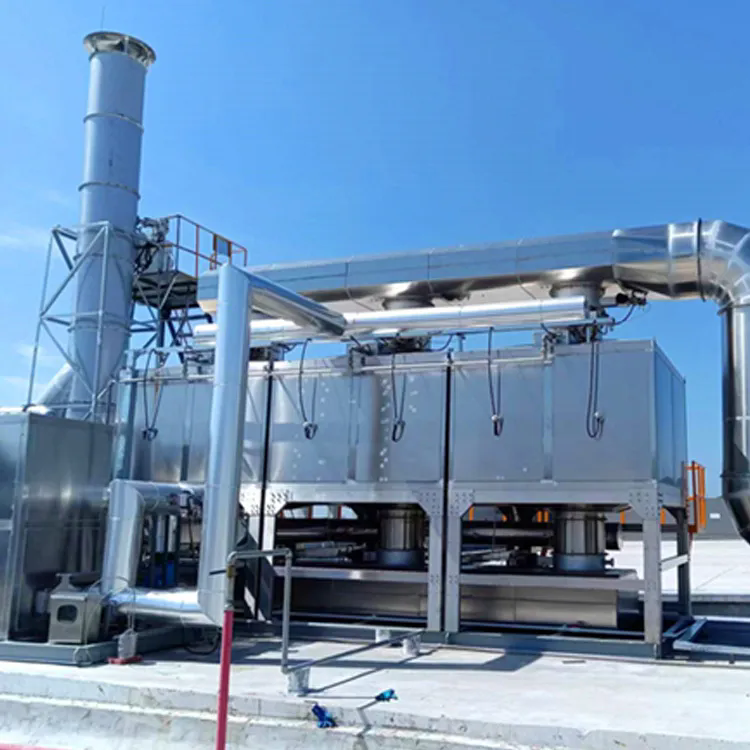Why Is Organic Waste Gas Treatment Equipment Essential for Sustainable Environmental Protection?
2024-11-14
As industries and urbanization continue to grow, so does the challenge of managing waste—particularly organic waste gases. These gases, which are often by-products of agricultural, industrial, and municipal processes, can be harmful to both human health and the environment if not treated properly. This is where Organic Waste Gas Treatment Equipment comes into play. But why is it so crucial, and how does it work to support sustainability and environmental protection? In this blog, we’ll dive into the importance of this equipment, the technologies behind it, and its role in creating a cleaner, more sustainable future.
What Is Organic Waste Gas Treatment Equipment?
Organic waste gas treatment equipment refers to specialized systems designed to remove or neutralize harmful gases emitted during the decomposition of organic materials. These gases can include a variety of volatile organic compounds (VOCs), methane, hydrogen sulfide, ammonia, and other pollutants. The equipment typically works by capturing these gases from waste sources such as landfills, wastewater treatment plants, agricultural waste, and industrial processes, and then purifying or converting them into less harmful substances.
There are different types of treatment equipment based on the specific gases involved and the desired outcome, such as biofilters, thermal oxidizers, adsorption systems, and chemical scrubbers. Each method uses a combination of filtration, chemical reactions, and biological processes to eliminate or reduce harmful pollutants.
Why Is Organic Waste Gas Treatment Important?
1. Environmental Protection: Organic waste gases, when released into the atmosphere, can contribute to air pollution and climate change. For example, methane is a potent greenhouse gas that has a much higher heat-trapping effect than carbon dioxide. By treating organic waste gases, we can reduce these harmful emissions and mitigate their impact on global warming.
2. Human Health: Many organic gases, such as ammonia and hydrogen sulfide, are not only toxic but also have foul odors. These gases can negatively affect air quality and public health, causing respiratory issues, nausea, and other illnesses. Proper treatment of these gases ensures that harmful pollutants do not pose a risk to local communities and workers.
3. Regulatory Compliance: Environmental regulations around the world are becoming stricter, and industries are required to meet certain standards for air quality and emissions. Investing in organic waste gas treatment equipment helps businesses comply with these regulations, avoid fines, and improve their sustainability efforts.
4. Resource Recovery: Some treatment systems, such as biogas recovery units, can even turn organic waste gases into valuable resources like renewable energy (biogas). This not only helps in reducing the environmental footprint of waste but also contributes to energy production, creating a more sustainable waste management cycle.
5. Odor Control: Industries like agriculture, food processing, and wastewater treatment often deal with unpleasant odors. Effective treatment systems help to neutralize these smells, improving quality of life for surrounding communities and workers.
How Does Organic Waste Gas Treatment Equipment Work?
Organic waste gas treatment equipment employs various technologies, each tailored to address specific types of waste gases. Here are some common methods used in gas treatment:
1. Biofiltration: This is one of the most eco-friendly ways to treat organic waste gases. Biofilters use microorganisms (bacteria, fungi, or algae) to break down organic pollutants in the air. As the waste gases pass through a biofilter, the microorganisms consume the contaminants, effectively cleaning the air. Biofiltration is particularly effective for removing compounds like ammonia, hydrogen sulfide, and VOCs.
2. Thermal Oxidation: In this method, organic waste gases are heated to high temperatures, causing them to break down chemically. The high heat in a thermal oxidizer burns off the pollutants, converting harmful gases into safer substances like carbon dioxide and water vapor. This process is highly effective for treating VOCs, methane, and other complex organic compounds.
3. Adsorption: Adsorption systems use materials like activated carbon or zeolite to capture and store waste gases. The pollutants are trapped in the porous structure of the adsorbent material, preventing them from being released back into the environment. This method is typically used for gases like VOCs and odorous compounds, and the adsorbent material can often be regenerated for repeated use.
4. Chemical Scrubbing: In chemical scrubbers, organic waste gases are passed through a liquid solution that reacts with the pollutants, neutralizing them. This can be particularly effective for gases like hydrogen sulfide, ammonia, and sulfur dioxide. The chemical reaction transforms the harmful substances into safer compounds, which can then be safely disposed of.
5. Membrane Filtration: This technology uses semi-permeable membranes to filter out unwanted pollutants from the waste gases. The membranes allow clean air to pass through while trapping contaminants, making it effective for treating VOCs and other volatile compounds.
Applications of Organic Waste Gas Treatment Equipment
Organic waste gas treatment equipment has a broad range of applications across various industries:
- Landfills: Methane and other gases emitted from decomposing organic waste in landfills can be harmful to the environment. Treatment systems are used to capture and reduce these gases, sometimes even converting them into usable energy (biogas).
- Agriculture: Animal farms and agricultural facilities often produce large amounts of organic waste gases. Treatment systems help to manage ammonia, methane, and other gases to reduce odors and emissions.
- Wastewater Treatment: The decomposition of organic matter in wastewater treatment plants can generate various gases, including hydrogen sulfide and methane. Treatment equipment helps to control these emissions and improve the quality of air in the surrounding areas.
- Food Processing: Industries like food manufacturing and processing release VOCs, ammonia, and other organic compounds as by-products. Treatment systems help reduce emissions and odors, contributing to a cleaner working environment.
- Chemical and Pharmaceutical Industries: These industries often deal with complex organic compounds that can be harmful if released into the environment. Organic waste gas treatment equipment helps manage these by-products safely.
Conclusion
As the world faces increasing environmental challenges, organic waste gas treatment equipment is playing an essential role in reducing air pollution, protecting public health, and mitigating climate change. By treating harmful gases at their source, businesses can comply with regulations, improve sustainability, and even turn waste gases into valuable resources. Whether it’s for industrial, agricultural, or municipal use, investing in the right organic waste gas treatment system is not just a smart choice—it’s a necessary step toward a more sustainable and healthier future for all.
So, if you're looking to make a positive environmental impact, whether in business or community settings, investing in organic waste gas treatment technology is a step in the right direction.



